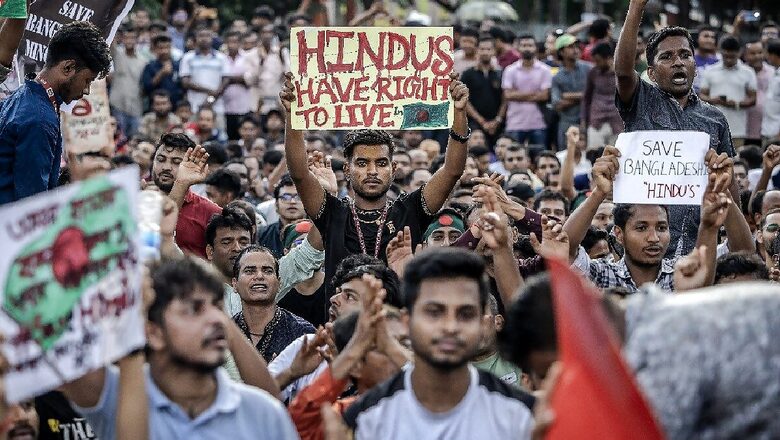
views
“The bitter lesson that may be drawn from this tragedy is that eternal vigilance is the price of civilisation” – Will Durant
On August 5, 2024, the Prime Minister of Bangladesh was forced to flee her country and resign following weeks of protests. What followed was, in a way, history repeating itself for the Hindus of the subcontinent over a thousand years, at the hands of religious bigots indulging in pillage and barbarism. Against the backdrop of extreme religious venom spewed on the streets of Bangladesh, one wonders if the advancement of science and technology has not changed the beliefs of some who still insist that the Earth is flat and that those who do not adopt their faith and share their worldview deserve to perish.
The disturbing visuals of the burning of places of worship and businesses belonging to Hindus reflect a deep-rooted evil that has, unfortunately, been the lived history of the subcontinent for over a thousand years. The evil forces that cannot see beyond their myopic bigotry are being bravely questioned by Hindus in Bangladesh. For they do not have the support of theocratic states to stand by them, for there are no Hindu theocratic nations in the world. Nepal, the last Hindu state, has also chosen to become secular. It may not be far from the truth to say that secularism is inherent in Sanatana Dharma. Hence, there is generally no major resistance to the idea of secularism in Hindu-majority nations or among Hindus.
The events of the past week in Bangladesh have shown two distinct sides of the story. On one side is the consistent religious barbarism targeting Hindus over a thousand years, while on the other side is the hope and courage demonstrated by Hindus in Bangladesh, who have come out to raise their voices against targeted violence.
The ISKCON temple, which is reported to have fed lakhs over decades, guided by the Sanatana principle of “manava seva madhava seva,” quietly without seeking to convert the recipients of the prasad, was burnt down and desecrated. The visuals revive the civilisational memory of temples being looted, destroyed, desecrated, and universities burned down by the very same barbaric worldview. The history of the Indian subcontinent is replete with such repeated assaults over centuries, including women being ravaged and taken as sex slaves, and unfortunately, it continues unabated.
Some support is being seen for the affected communities across the world from Hindu organisations and other sane souls. It may not be inaccurate to say that the majority of Hindus, wherever they are, have been conditioned by their own to suffer in silence when targeted for their religious beliefs, lest they be labelled as “communal.”
What also stands exposed is the ideologically driven human rights industry and its hollow claims to advocate for human rights. Some of our politicians have already issued subtle warnings that similar events could occur in India. I would like to believe that Bharat, as a responsible civilisational state that has never endorsed religious bigotry, would handle any such situation adeptly.
As George Santayana aptly stated, “Those who cannot remember the past are condemned to repeat it.” With this in mind, it’s crucial to examine the history of religious barbarism in the Indian subcontinent. In his renowned work, The Story of Civilization, specifically Chapter VI, ‘The Moslem Conquest,’ published in March 1935, Will Durant made the following observations regarding the plight of Hindus: “The Mohammedan Conquest of India is probably the bloodiest story in history. It is a discouraging tale, for its evident moral is that civilisation is a precarious thing, whose delicate complex of order and liberty, culture and peace may at any time be overthrown by barbarians invading from without or multiplying within.”
For those who may not be aware, present-day Bangladesh was an integral part of pre-partition India, as noted by Will Durant when he published his work in March 1935. After the religious partition of 1947, an Islamic theocratic state was carved out on the west and east of India, named Pakistan. In 1971, Bangladesh became an independent nation when the umbilical cord of faith could no longer hold West and East Pakistan together.
What the Bangladeshi Hindus have done by stepping out onto the streets and raising their voices is nothing short of an act of courage in the face of great adversity. They are letting the world know that they exist and take pride in their nation, which was built on linguistic identity and rejected the bond of faith when it parted ways with Pakistan in 1971. Their assertion of the right to remain Hindu and proud Bangladeshis on the very streets where religious bigots were burning down temples just hours ago demonstrates their innate resilience and strength of character. This strength has allowed them to stay connected to their civilisational roots and the land of their ancestors.
The Hindu resistance against the repetition of history seen on the streets of Bangladesh needs to be celebrated as a moment of awakening to the harsh reality that those who do not learn from history are bound to suffer. People have shown the courage to stand by their faith and assert their basic ‘Right to Life’, guaranteed to every human being regardless of their identity. The international conventions and Universal Declarations of Human Rights appear to be mere paper resolutions in reality, whether in Afghanistan, Pakistan, or now Bangladesh, when it comes to the rights of Hindus and other minorities who have been living there for generations.
The message from the hate campaigns on US campuses and the streets of Bangladesh shares a common subtext. Both subscribe to a worldview that believes “others” do not have the right to exist except at the mercy of the bigots. This kind of hatred has been constantly fanned and spread by ideologies of hate, which draw a parallel with the religious bigots who resort to “othering” non-believers, legitimising violence to dehumanise these “others”. These ideologies label people as “oppressors” purely based on their faith or cultural identities, while empathising with those whose cause they adopt, as per Karl Marx’s diktat in The Communist Manifesto, by identifying them as “oppressed” and deliberately ignoring empirical evidence to the contrary.
Not to mention their ecosystems’ power to ‘cancel’ anyone who questions their views with well-funded and orchestrated fake narratives. Comrades of these hate mongers would like to downplay or rationalise bigotry, as their own ideology chooses oppressors and the oppressed purely based on who they are, rather than what they have done.
The trend of romanticising hate and subtly justifying genocide based on faith on US campuses, coupled with the silence of human rights entrepreneurs in India and abroad regarding what’s happening in Bangladesh, cannot be mere coincidence. It suggests there might be a financial incentive to dull their commitment to human rights. After all, I believe there are no coincidences.
Being vigilant about the growing global trend of celebrating hate and the spread of “no-go zones for law enforcement agencies” is a serious and immediate threat to human civilisation posed by religious bigotry. Calling out bigotry directly is the only way forward, as demonstrated by the brave Hindus of Bangladesh who are raising their voices from the streets.
Sridhar Potaraju is a Senior Advocate practising in Supreme Court of India. Views expressed in the above piece are personal and solely those of the author. They do not necessarily reflect News18’s views.

















Comments
0 comment